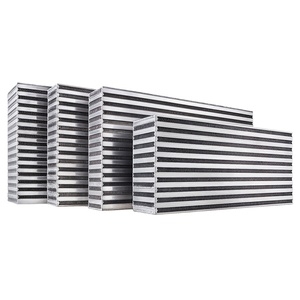Introduction to Intercooler Core Air
The intercooler core air is a critical component in automotive and industrial applications, designed to enhance engine efficiency and performance. By cooling the air compressed by the turbocharger or supercharger, the intercooler enables the engine to intake denser air, ensuring optimal combustion and improved power output. This essential part is used across various vehicles—from sports cars to heavy-duty trucks—and plays a pivotal role in enhancing performance while maintaining engine longevity.
Types of Intercooler Core Air
Intercooler core air systems come in various types and designs, each tailored for specific applications and performance needs:
- Air-to-Air Intercoolers: These are the most common and use ambient air to cool the compressed air. They’re lightweight and typically found in performance cars and trucks.
- Air-to-Water Intercoolers: Utilizing water as a cooling medium, these intercoolers are highly efficient and effective for sustained high performance, often used in motorsports.
- Bar and Plate Intercoolers: Known for their durability and efficiency, these intercoolers have a unique construction that maximizes surface area and improves heat dissipation.
- Tube and Fin Intercoolers: These are more lightweight and compact, making them suitable for applications where weight saving is essential, although they may be less efficient than bar and plate designs.
Function and Features of Intercooler Core Air
The primary function of the intercooler core air is to lower the temperature of the compressed air that enters the engine, optimizing performance. Key features include:
- Improved Air Density: Cooling the air increases its density, allowing for more oxygen in the combustion chamber.
- Reduced Engine Knock: Lower temperatures reduce the chances of pre-ignition, enhancing safe engine operation.
- Enhanced Mileage and Power: By promoting efficient combustion, intercoolers can increase both horsepower and fuel efficiency.
- Durable Construction: Many intercoolers are made from lightweight aluminum or high-grade plastic, offering a balance of strength and performance.
- Customizable Designs: Intercoolers can often be customized to fit specific vehicle setups, ensuring maximum efficiency tailored to different performance needs.
Applications of Intercooler Core Air
Intercooler core air systems are employed across a broad spectrum of applications, aiding in the performance enhancement of various engines:
- Automotive Racing: High-performance vehicles use intercoolers to reach optimal speeds without compromising on engine safety.
- Heavy-Duty Trucks: These vehicles require robust cooling solutions to handle demanding environments and loads.
- Industrial Machinery: Intercoolers are also crucial in heavy machinery engines, ensuring they operate efficiently under heavy loads.
- Sport and Muscle Cars: Enhancing performance in consumer vehicles, intercoolers contribute to a better driving experience.
- Motorcycles: Compact intercoolers are increasingly found in high-performance bikes, optimizing engine power without adding much weight.
















































